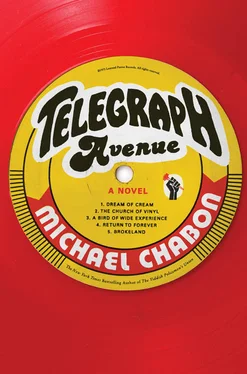“Hee breaths,” Nat managed to dig up from somewhere.
“Shut the fuck up,” Gwen countersuggested.
Paddling to stay on top of the wave as it broke, trying to ride it. A big one, really big, the biggest one yet, high, wide, deep, and rolling on and on like an earthquake. Impervious as an earthquake to her will, which amounted in the end to nothing more than the words “please be over” repeated for what felt like hours.
This time there was no rest between measures, no patch of blue. The flow of pain within her simply shifted, shunted by some switch in the rail yard of her nervous system, from the bands of steel that belted her abdomen to someplace lower and farther inside. To her horror, then, and as from a great distance, she heard her own voice blubbering, pleading with Nat, begging him to run and get Aviva, drag her ass out of that other room with that cupcake girl, that skinny little tattooed chicken wing, because the baby was coming now , and Aviva needed to be there to catch it. For so long Gwen had scorned, condescended to, or pitied, in varying measure, the doomed and futile dreams, the hopeful visions of soft light and ambient music and a kind of vaginal satori, that pregnant women were prone, in their birth plans, to fall to dreaming. Now she saw that her own doomed birth plan, simple as it was, burned in her heart with a utopian fire. It comprised only one item, and that was Aviva, calm and crafty, without resort to knives, drugs, or synthesized hormones, smuggling the life of her man-child into the light. Any light, any child; let the only certainty be Aviva Roth-Jaffe. Gwen swore to Nat and to Sally, when the nurse came back in to announce that the doctor was on his way, that she would not permit this baby to exit her body, that she would hang on to him, that she would chew nails, lasso herself to granite boulders, fold space-time down to an endless single point, until Aviva could be fetched.
“Go!” she tried, and maybe, right about then, she went a little crazy. “Jesus Christ, Nat, you’re so fucking slow ! Go get Aviva now! ”
And yet all the time that she raved, and fought, and swore to keep the baby clutched within the intricate and formidable musculature of her uterus, she felt, more powerfully than any sorrow over the spoiling of her birth plan or the latest and greatest failure of her husband to meet his obligations to her, an urge to push the baby out. She knew that it would be useless, too late, for anybody to run.
Nobody ran. Nat got to his feet. There was something weird in his expression, a stoniness, a condemned look, as if he had made up his mind to do something irretrievable. Looking back at this moment afterward, Gwen would see him stepping into a harsh shaft of light.
“A minute,” Gwen said. “Just one. Oh, Nat, please. Let’s wait for Aviva just one more minute.”
“No fucking way,” Nat said.
So she abandoned her modest dream of utopia, pushed it out of herself with the violence of disappointment.
“I am going to shit,” she announced.
“Okay,” Nat said. “Go for it.”
“It’s going to be so disgusting. I’m so disgusting.”
“That reminds me,” Nat said. He went into the bathroom and washed his hands, lathering them with a precision she found commendable from the standpoint of hygiene but questionable given the imminence of parturition and, given the size of the turd that she felt she was about to expel from her bowels, possibly premature.
“Oh my goodness,” she said. “Oh, Nat, oh.”
He hurried out of the bathroom, drying his hands on a towel. Without apparent hesitation, he directed his attention to her crotch and said, “Oh my God. Okay.”
He leaned in, reaching toward her, hunching the way he hunched over the keys of a piano. With a sense of regret, Gwen forced herself to stop pushing. The irritation, the discontent verging on rage that had been flowing freely through her for the last hour backed up inside her, weighing like a dammed river against the floodgates. She balanced on a point between rage and its relief. Amid the layers of conscious thought and the involuntary actions of her body, Gwen found herself in possession, coolly palmed in her thoughts like a dollar coin, of the idea that she was about to bring another abandoned son into the world, the son of an abandoned son. The heir to a history of disappointment and betrayal, violence and loss. Centuries of loss, empires of disappointment. All the anger that Gwen had been feeling, not just today or over the past nine months but all her life—feeding on it like a sun, using it to power her engines, to fund her stake in the American dream—struck her for the first time as a liability. As purely tragic. There was no way to partake of it without handing it on down the generations.
Then Archy walked into the room in a yachting cap. Stood there gawping at her. He looked a mess, creased, untucked, his hair misshapen. In the instant before his new son tumbled, bawling and purple, into mortality and history, Gwen’s heart was starred like a mirror by a stone. One day the feeling might come to resemble forgiveness, but for now it was only pity, for Archy, for his father and his sons, for all the men of whom he was the heir or the testator, from the Middle Passage, to the sleeper cars of the Union Pacific, to the seat of a fixie back-alleying down Telegraph Avenue in the middle of the night.
Then she was holding her own little man, with his smell like a hot penny and his milky blue eyes, and although she had taken no drugs and received no anesthesia, she thought she must be feeling kind of loopy nevertheless, because it seemed to her that a handsome black uniformed policewoman, whose name-badge read LESTER, had come into the LDR along with Nurse Sally and Dr. Lazar—brown cop, golden nurse, white doctor, all of a sudden it was like some kind of nightmarish version of Sesame Street in here—and was asking Nat Jaffe to come along with her. Nat washed his hands and then, exchanging a hangdog shrug with his partner, followed Officer Lester out of the room.
“What’d I miss?” said Archy.
A2002 Subaru Outback station wagon, fatigues-green, pulled into the driveway of the house on Stonewall Road, over the blood-brown stain deposited five weeks earlier by the leaky gaskets of Aviva Roth-Jaffe’s Volvo. The man of the house, red-bearded and slight, was in the carport, adrift on a floe of spread newspaper, painting a blue crib white. He worked his brush down one slat, finishing the stroke with a dainty twist of the wrist, laid the brush across the open mouth of his paint can, and rose to his feet, clad in a spattered pair of fawn Naot sandals. You could see from his diffident smile that neither the Subaru nor the occupants of its front seat, a hulking black man in a pumpkin beret and a black teenager who, even through the windshield, was visibly in the grip of an intense, perhaps fatal, spasm of embarrassment, meant anything to him.
“The plaintiff,” said the occupant of the backseat, concealed from view by the driver and by the fact that she was canted over the car seat—duly faced to the rear—with her blouse unbuttoned, her bra cup unlatched, her nipple the sole joy and plaything of the car seat’s occupant, whose parents had argued, though only briefly, over whether to name him Kudu (suggested by his father) or (in honor of his maternal grandfather) Clark. She was topping Clark off now, having restored him to sleep after he determined, for unknown reasons, to cause a disturbance midflight.
Just as she eased the cork of her nipple with a moist pop—a sound that never failed to densify the cloud of embarrassment around Clark’s older brother—from the slumbering vessel into which two ounces of rich hindmilk had just been decanted, a second Outback rolled to a stop along the curb. From it emerged the cetacean form of Michael Oberstein, Esq., in a remarkably ugly taupe mohair suit whose construction, Archy thought, must have necessitated the cruel slaughter of dozens, possibly hundreds, of moes. It did not so much clothe as wad him.
Читать дальше
Конец ознакомительного отрывка
Купить книгу












